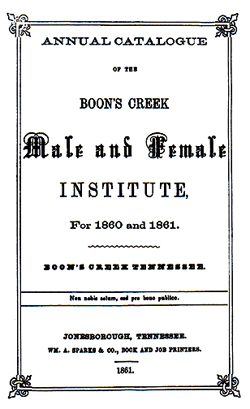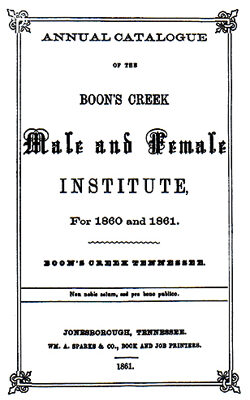An impressive booklet titled “Annual Catalogue of Boon’s Creek Male and Female Institute for 1860 and 1861” embodies a time in history nine years before Johnson’s Depot (Johnson City) was incorporated.

Sue Car Eckstein submitted the 8-page booklet that was printed in Jonesborough. The principal that year was Thomas P. Summers; Miss Nannie E. Bowers and John W. Burke were assistants. The Board of Trustees included Lawrence Bowers (Chairman), George P. Faw (Secretary), James Vaughn, Perry Hunter, William P. Reeves, David J. Carr, Elbert S. Cox, Fuller P. Hale and Alfred M. Crouch. All were from “Boon’s Creek” except for Reeves who resided in Jonesborough.
Fifteen men served on the Board of Visitors. Three were from Boon’s Creek: Dr. Alfred Martin, Joseph D. Clark and Samuel E. Edwards, Esq. Five lived in Johnson’s Depot: Rev. James Miller, Caswell C. Taylor, Peter M. Reeves, Esq., Alfred Carr, Esq. and Samuel E. Miller, Esq. Two resided in nearby Fordtown: William C. Newell and Richard Kitzmiller. Three called Jonesborough their home: Rufus P. Wells, Alexander N. Harris and A.G. Graham (Attorney at Law). Nathaniel B. Taylor’s address was listed as Elizabethton.
Next, the students’ names were revealed in separate lists, 73 male and 24 female. Proving that a good education was worth traveling long distances or perhaps staying with someone in the area, it was interesting to note where the 97 students were from: Allison’s Mills (6), Bedford County (1), Boon’s Creek (48), Buffalo Ridge (5), Carter County (4), Cherokee (2), Cox’s Store (2), Elizabethton (1), Embreeville (1), Johnson County (1), Johnson’s Depot (9), Jonesborough (7), Knob Creek (1), Longmire’s (2) New Stirling (North Carolina) (1), Sequine (Texas) (1), Taylorsville (2), Watauga Bend (1) and Wheat Vale (2).
The catalogue further stated: “The institute is located in the quiet, pleasant and beautiful valley of Boon’s Creek seven miles north of Jonesborough. The building is commodious and comfortably furnished. The morality and healthfulness of the neighborhood are unsurpassed. Here students are far removed from inducements to extravagance and almost entirely free from the demoralizing influence of alcohol, the bane of schools.”
The publication went on to provide a brief history of the school. It was erected in 1853 and chartered by the Legislature on February 15. 1856. The goals of the institute were to prepare students either for college or to equip them for “the duties of active life.” The success of the educational facility was credited to the wisdom of its founders. The principal spared no labor to improve the pupil’s hearts and heads. Thoroughness in everything was accentuated as a primary aim, not how much but how well. The administration was said to be mild in its nature but firmly and impartially administered.
Students were required to adhere to four conditions: to conform cheerfully to all rules and regulations of the school, to manifest a desire to improve, to use no profane or unbecoming language and to abstain from intoxicating beverages.
Progress reports to student’s parents were issued in the form of quarterly letters when desired, stating the deportment and proficiency of their “children or wards.” Students living some distance from the Institute were urged to come by public conveyance to Jonesborough or Johnson’s Depot and then onto Boon’s Creek. The cost was declared to be very reasonable.
The catalogue expressed the school’s appreciation for the liberal patronage that it had received from surrounding communities. Its hope was to “merit an extension of the same.” The school year was divided into two sessions. The fall session commence on the third Thursday in August and continued for 20 weeks, with a week’s holiday for Christmas. The spring session began at the close of the fall session and continued another 20 weeks. No mention of other holidays was noted.
Tuition per session was listed by groups: Spelling, Reading and Writing, $5; Mental Arithmetic, Primary Geography, English Grammar, $6; English Grammar, Arithmetic, Geography and Watts on the Mind, $7.50; Nat. and Mental Philosophy, Rhetoric and Geography of the Heavens, $9; Elementary Algebra, Astronomy, Anatomy, Physiology, etc. $10; and Latin, Greek, Algebra, Geometry, Logic, Moral Science and Criticism, $12. Students were assessed an incidental fee of up to 50 cents for items such as wood, repairs, etc. Lodging was available in the surrounding area from $1.25 to $1.50 per week.
Textbooks used at the school were Webster’s Speller, Definer and Dictionaries; McGuffey’s Series of Readers; Mitchell’s Geographies; Davies’ Arithmetics, Algebras and Legendre; Bullion’s English, Latin and Greek Grammars; Peterson’s Familiar Science; Emerson’s Watt’s on the Mind; Comstock’s Chemistry, Philosophy and Mineralogy; Cutter’s Anatomy, Physiology and Hygiene; Kame’s Elements of Criticism; Alexander’s Evidences of Christianity and Tooke’s Pantheon. Latin books included Bullion’s Reader; Anthon’s Caesar, Virgil. Cicero, Sallust and Horace; Brooks Ovid; and Folsom’s Livy. Greek texts were Arnold’s Lessons; Bullion’s Reader; Xenophon’s Anabasis and Cyropedia; Isocrates; Herodotus, Demosthenes, Plato and Homer. A further note stated, “Students must conform to the established textbooks.”
The catalogue made a curious statement from the Board of Trustees, who at their annual meeting adopted the following resolution:
“Whereas, Thomas P. Summers has been principal of Boon’s Creek Male and Female institute for more than four years; therefore,
“Resolved, That we, the Board of Trustees, have found in Mr. Summers not only a gentleman, but also a faithful and competent teacher, and that on our part we have no desire to make a change, but while he would continue to foster the interests of our Institution, as heretofore, he would be our first choice.
“Further Resolved, That if Mr. Summers’ sense of duty should not permit him to remain longer with us, that he retires with our best wishes for his future welfare and that we hereby comment him to the esteem and confidence of those with whom he hereafter become associated.” The statement was signed by Perry Hunter, Chairman, pro tem.
Mr. Summers responded with his appreciation to the board by thanking them for their sympathy and encouragement since he has been associated with them in the conduct of the school and for their high appreciation of his services.
The highly appealing eight-page publication concluded with a note from the Literary Society: “There is in connection with the Institution and under the fostering care of the Principal and Trustees, a Literary Society, which is doing a good work in its department. Young men wishing to cultivate the art of forensic speaking will find it a valuable auxiliary. All those indebted to the Institution are earnestly requested to make settlement at an early day. This is the first call, ‘verbum sat sapienti’” The Latin phrase means, “A word is sufficient for a wise man.”

Comments are closed.